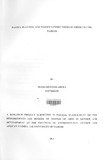| dc.description.abstract | Unmet need for family planning is a core concept in international population discourse. The main aim of this study was to explore women’s unmet needs in family planning methods in Kibera slums, Nairobi. Specifically the study sought to:- determine the knowledge, attitude and practice (KAP) of family planning amongst women in Kibera; determine the proportion of women accessing and utilizing family planning methods and establish the barriers to access and use of family planning methods that women face.
The study was guided by Westoff and Ochoa’s (1991) model for the determination of unmet need for family planning amongst women in reproductive age. The model served as a conceptual framework for understanding the level of women’s unmet needs in family planning methods based on the limiters, spacers and none usage. A non-probability sampling procedure was used to identify 100 women within four sampled villages of Kibera. Structured questionnaire complemented with key informant interviews, focus group discussions and case narratives were used as the main data collection instruments. Quantitative data were analyzed using Statistical Package for Social Sciences (SPSS) and qualitative data analyzed thematically.
The study found out existence of a high level of unmet needs in family planning methods amongst women resulting from low level of knowledge, attitude and practice of family planning methods. The study found out that majority of women experiences political, economic, sociocultural
and technological barriers to access and utilization of family planning methods. Therefore this study recommends that family planning methods should be both age and gender sensitive and responsive to the people’s knowledge, attitude and practice levels. For efficient and effective family planning programming, both men and women must be fully involved. In addition, the study recommends that family planning methods should be designed to overcome women’s barriers to access and utilization of family planning methods. | |

